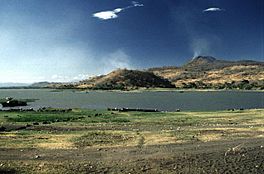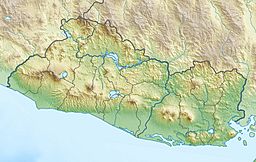Lake Güija facts for kids
Quick facts for kids Lake Güija |
|
|---|---|

Lake Güija with Volcán de San Diego in the upper right
|
|
| Location | Jutiapa, Metapan, Santa Ana |
| Coordinates | 14°16′N 89°31′W / 14.267°N 89.517°W |
| Type | Volcanogenic lake |
| Native name | Lago de Güija (Spanish) |
| Primary inflows | Ostúa River |
| Basin countries | Guatemala, El Salvador |
| Surface area | 45 km2 (17 sq mi) |
| Surface elevation | 430 m (1,410 ft) |
| Official name: Complejo Güija | |
| Designated: | 16 December 2010 |
| Reference #: | 1924 |
Lake Güija is a cool lake located in Central America. It sits right on the border between two countries: Guatemala and El Salvador. The lake covers about 45 square kilometers (that's 45 km²), and most of it, around 32 km², is in El Salvador.
This lake has an interesting story! It was formed by volcanoes a long, long time ago. A huge flow of lava from the Volcán de San Diego blocked a natural valley. This blockage created the large lake we see today.
Lake Güija gets its water from several rivers, including the Ostúa, Angue, and Cusmapa. The water then flows out from the lake's southeastern side through a river called the río Desagüe. This river eventually joins the much larger río Lempa.
Around the lake, you can see several old volcanic cones. These include the Mita, San Diego, and Cerro Quemado volcanoes. On the Salvadoran side of the lake, there are a few small islands. These islands are Teotipa, Cerro de Tule, and Iguatepec. On Iguatepec island, many ancient pre-Columbian pottery pieces have been found. People started digging and finding these items in 1924. Also, a special forest called Bosque San Diego La Barra is located on the eastern side of the lake.
Lake Güija's Special Status
Lake Güija is recognized as a very important place. On September 21, 1992, it was added to the UNESCO World Heritage Tentative List. This means it's being considered for an even more special status.
Being on the World Heritage list means a place has outstanding value for all of humanity. Lake Güija is considered a "Mixed" site. This means it's important for both its natural beauty and its cultural history. The ancient pottery found on its islands shows its cultural importance. Its unique volcanic formation and natural environment show its natural value.
See also
 In Spanish: Lago de Güija para niños
In Spanish: Lago de Güija para niños
 | Jackie Robinson |
 | Jack Johnson |
 | Althea Gibson |
 | Arthur Ashe |
 | Muhammad Ali |


